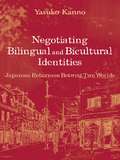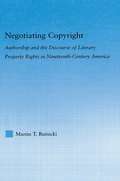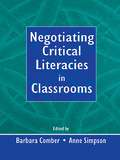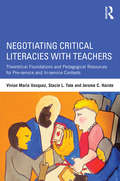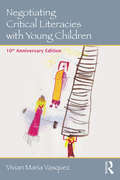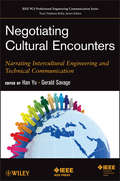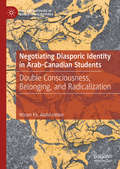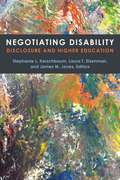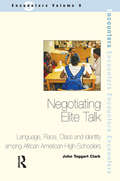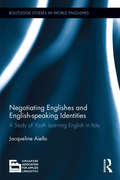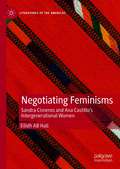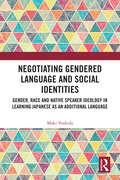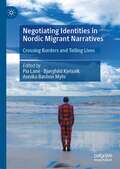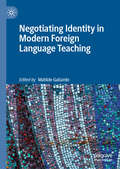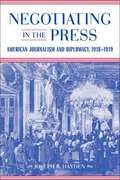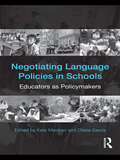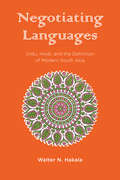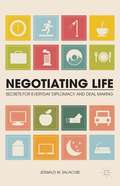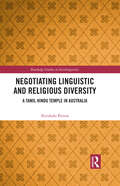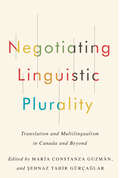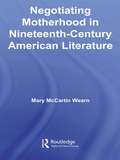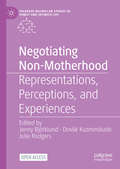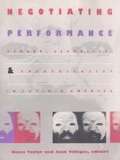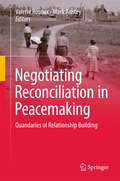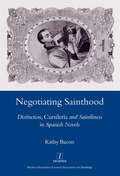- Table View
- List View
Negotiating Bilingual and Bicultural Identities: Japanese Returnees Betwixt Two Worlds
by Yasuko KannoThis book examines the changing linguistic and cultural identities of bilingual students through the narratives of four Japanese returnees (kikokushijo) as they spent their adolescent years in North America and then returned to Japan to attend university. As adolescents, these students were polarized toward one language and culture over the other, but through a period of difficult readjustment in Japan they became increasingly more sophisticated in negotiating their identities and more appreciative of their hybrid selves. Kanno analyzes how educational institutions both in their host and home countries, societal recognition or devaluation of bilingualism, and the students' own maturation contributed to shaping and transforming their identities over time. Using narrative inquiry and communities of practice as a theoretical framework, she argues that it is possible for bilingual individuals to learn to strike a balance between two languages and cultures. Negotiating Bilingual and Bicultural Identities: Japanese Returnees Betwixt Two Worlds: *is a longitudinal study of bilingual and bicultural identities--unlike most studies of bilingual learners, this book follows the same bilingual youths from adolescence to young adulthood; *documents student perspectives--redressing the neglect of student voice in much educational research, and offering educators an understanding of what the experience of learning English and becoming bilingual and bicultural looks like from the students' point of view; and *contributes to the study of language, culture, and identity by demonstrating that for bilingual individuals, identity is not a simple choice of one language and culture but an ongoing balancing act of multiple languages and cultures. This book will interest researchers, educators, and graduate students who are concerned with the education and personal growth of bilingual learners, and will be useful as text for courses in ESL/bilingual education, TESOL, applied linguistics, and multicultural education.
Negotiating Copyright: Authorship and the Discourse of Literary Property Rights in Nineteenth-Century America (Literary Criticism and Cultural Theory)
by Martin T. BuinickiFirst Published in 2006. Routledge is an imprint of Taylor & Francis, an informa company.
Negotiating Critical Literacies in Classrooms
by Barbara Comber Anne SimpsonNegotiating Critical Literacies in Classrooms brings together accounts of educators who have sought to make a difference in the lives of their students through literacy education--from university classrooms in the United States, England, and South Africa, to policy and curriculum development in Singapore and Australia. Each chapter represents the results of extended research on classroom practice. The authors in this collection write as teachers. The literacy classrooms they explore range from the early years of schooling, to primary and secondary education, through to community and university sites. Although the volume is organized around different levels of education, clearly overlapping themes emerge across the chapters, including identity formation and textual practices, politicizing curriculum and textbook production, and changing the power relations in classroom talk around text. An overarching theme of this collection is the belief that there is no one generic, universal critical literacy--in theory or in practice. Rather, the authors reveal how a range of theories can serve as productive starting points for educators working on social justice agendas through the literacy curriculum, and, equally important, how particular critical literacy theories or pedagogies must be worked out in specific locations. In each of these accounts, educators explain how they have taken a body of theory and worked with and on it in classrooms. Their rich portrayals and narratives of classroom realities illustrate the unanticipated effects of pedagogies that emerge in specific contexts. Experiences from the classrooms have led them to revise theories that are central to critical literacy, including constructs such as "empowerment," "resistance," and "multiple readings." This collection documents what occurs when educators confront the difficult ethical and political issues that evolve in particular classroom situations. Negotiating Critical Literacies in Classrooms is appropriate as a text for courses in language and literacy education, and will be of broad interest to educational researchers, practitioners, and theorists. The practical classroom focus makes this book accessible and of interest to a wide range of teachers and an excellent resource for professional development. The international scope will appeal to a global educational readership.
Negotiating Critical Literacies with Teachers: Theoretical Foundations and Pedagogical Resources for Pre-Service and In-Service Contexts
by Jerome C. Harste Vivian Maria Vasquez Stacie L. TateHow can teacher educators engage pre-service and in-service teachers in learning about and framing their teaching from a critical literacy perspective? What does this mean? Why is it important? To address these questions, this book offers a theoretical framework and detailed examples, pedagogical resources, and insights into ways to build critical literacies with teachers in and out of school. Its unique contribution is to bridge critical literacy theory and teacher education. Participants in teacher education programs and professional development settings are often reminded of the need to build curriculum using children’s inquiry questions, passions and interests but generally this message is delivered only through telling (lectures) or showing (examples from other people’s classrooms). This book advances critical literary by explaining and illustrating how teacher educators can do much more—by creating opportunities for pre-service and in-service teachers to "live critical literacies" through experiencing firsthand what it is like to be a learner where the curriculum is built around teachers’ own inquiry questions, passions, and interests.
Negotiating Critical Literacies with Young Children: 10th Anniversary Edition (Language, Culture, and Teaching)
by Vivian Maria VasquezIn this innovative and engaging text, Vivian Maria Vasquez draws on her own classroom experience to demonstrate how issues raised from everyday conversations with pre-kindergarten children can be used to create an integrated critical literacy curriculum over the course of one school year. The strategies presented are solidly grounded in relevant theory and research. The author describes how she and her students negotiated a critical literacy curriculum; shows how they dealt with particular social and cultural issues and themes; and shares the insights she gained as she attempted to understand what it means to frame ones teaching from a critical literacy perspective. New in the 10th Anniversary Edition New section: "Getting Beyond Prescriptive Curricula, the Mandated Curriculum, and Core Standards" New feature: "Critical Reflections and Pedagogical Suggestions" at the end of the demonstration chaptesr New Appendices: "Resources for Negotiating Critical Literacies" and "Alternate Possibilities for Conducting an Audit Trail" Companion Website: narratives of ways in which the audit trail has been used as a tool for teaching and learning; resources on critical literacy including links to other websites and blogs; podcast focused on critical literacy and young children
Negotiating Cultural Encounters: Narrating Intercultural Engineering and Technical Communication, 1st Edition
by Han Yu Gerald SavageDiscusses the challenges of intercultural communication in engineering, technical, and related professional fields Given today's globalized technical and engineering environment, intercultural communication is an essential topic for engineers, other technical professionals, and technical communicators to learn. Engineering programs, in particular, need to think about how to address the ABET requirement for students to develop global competence and communication skills. This book will help readers learn what intercultural communication is like in the workplace--which is an important first step in gaining intercultural competence. Through narratives based on the real experiences of working professionals, Negotiating Cultural Encounters: Narrating Intercultural Engineering and Technical Communication covers a range of design, development, research, and documentation projects--offering an authentic picture of today's international workplace. Narrative contributors present firsthand experience and perspectives on the complexities and challenges of working with multicultural team members, international vendors, and diverse customers; additional suggested readings and discussion questions provide students with information on relevant cultural factors and invite them to think deeply and critically about the narratives. This collection of narratives: Responds to the need for updated firsthand information in intercultural communication and will help us prepare workplace professionals Covers various topics such as designing e-commerce websites, localizing technical documentation, and translating workplace safety materials Provides hands-on studies of intercultural professional communication in the workplace Is targeted toward institutions that train engineers for technical communication tasks in diverse sociocultural environments Presents contributions from a diverse group of professionals Recommends additional material for further pursuit A book unlike any other in its field, Negotiating Cultural Encounters is ideal for all engineering and technical communication professionals seeking to better communicate their ideas and thoughts in the multicultural workplaces of the world.
Negotiating Diasporic Identity in Arab-Canadian Students: Double Consciousness, Belonging, and Radicalization (Palgrave Studies in Educational Futures)
by Wisam Kh. Abdul-JabbarThis book, framed through the notion of double consciousness, brings postcolonial constructs to sociopolitical and pedagogical studies of youth that have yet to find serious traction in education. Significantly, this book contributes to a growing interest among educational and curriculum scholars in engaging the pedagogical role of literature in the theorization of an inclusive curriculum. Therefore, this study not only recognizes the potential of immigrant literature in provoking critical conversation on changes young people undergo in diaspora, but also explores how the curriculum is informed by the diasporic condition itself as demonstrated by this negotiation of foreignness between the student and selected texts.
Negotiating Disability: Disclosure and Higher Education
by Stephanie L Kerschbaum Laura T Eisenman James M JonesDisability is not always central to claims about diversity and inclusion in higher education, but should be. This collection reveals the pervasiveness of disability issues and considerations within many higher education populations and settings, from classrooms to physical environments to policy impacts on students, faculty, administrators, and staff. While disclosing one’s disability and identifying shared experiences can engender moments of solidarity, the situation is always complicated by the intersecting factors of race and ethnicity, gender, sexuality, and class. With disability disclosure as a central point of departure, this collection of essays builds on scholarship that highlights the deeply rhetorical nature of disclosure and embodied movement, emphasizing disability disclosure as a complex calculus in which degrees of perceptibility are dependent on contexts, types of interactions that are unfolding, interlocutors’ long- and short-term goals, disabilities, and disability experiences, and many other contingencies.
Negotiating Elite Talk: Language, Race, Class and Identity Among African American High Schoolers
by John Taggart ClarkLen Gregory is a law school student. As part of his elite law school's community outreach programme, he finds himself in a local high school several times a week passing on his own legal knowledge to the students in a course he teaches entitled Street Law. This book shows that passing on legal knowledge is not the only thing Len is doing in Street Law. He is also trying to get his students to talk and argue about the law in the same way that he does. Len talks about legal matters using hypothetical, speculative scenarios played out by generic people - if people occur at all in his scenarios. The students, meanwhile, recount anecdotes inhabited by real people doing things in the real world. This book describes how Len and the Street Law students negotiate Len's language promotion project scheme, that is, how the students go along with or resist Len's promotion. The consequences of this negotiation are high: the abstract/speculative inquiry style promoted by Len carries social value - to be able to talk as Len does is to be able to talk as powerful members of society talk, and Len is offering the Street Law students access to that social capital. However, this book shows how the Street Law students identify abstract/speculative inquiry as being the talk of the (elite, white) Other - not, in other words, a way of talk that, by and large, utters their social identity. The book examines this negotiation and tension between learning economically powerful ways of talking in the larger social marketplace and maintaining an authentic local social identity.
Negotiating Englishes and English-speaking Identities: A study of youth learning English in Italy (Routledge Studies in World Englishes)
by Jacqueline AielloThis book explores the effects of the global spread of English by reporting on a sequential explanatory mixed-methods study of the language attitudes, motivation and self-perceived English proficiency of youth in two Italian cities. Participant narratives highlight the far-reaching role that English plays on the performance and attainment of present and desired future selves, illustrate that English is understood not as singular but as plural and paradoxical, and reveal that English learners, who do not all accept the capital of ‘native’ speakers, utilize tactics to negotiate their position(s) with respect to their target language. On the one hand, by narrowing in on a specific population and drawing extensively on interview exchanges, this work provides readers with a nuanced depiction of the identities, milieu and learning experiences of English language learners in Italy. On the other hand, this level of detailed analysis gives insight into the understandings, construction of meaning and negotiations of language learners who need and want to acquire English, the global language, worldwide. Indeed, the issues and questions that are raised in this book, such as those concerning research approaches and the definitions assigned to key concepts, have profound implications on the research of English(es) today and can inform future directions in global English teaching.
Negotiating Feminisms: Sandra Cisneros and Ana Castillo’s Intergenerational Women (Literatures of the Americas)
by Eilidh AB HallNegotiating Feminisms examines intergenerational feminism in Chicanx family life. It analyses literary representations of the ways that Chicanas negotiate feminisms in the family across generations, through the maintenance, contestation, and adaptation of traditional gender roles. Using an original theoretical lens of negotiation to read the works of Ana Castillo and Sandra Cisneros, this book unpacks intergenerational resistance to patriarchal oppression. This book shows how the works of Cisneros and Castillo articulate a politics of negotiation that critiques the gendered ideologies and roles of the family. In doing so, the book’s discussion not only engages with literary representations but also connects these representations to the contextual experience of Chicanx family life. This book calls for a rethinking of women characters beyond limited, and limiting, familial roles and uses the framework of feminist negotiation as a means to explore the empowering possibilities of intergenerational female relationships.
Negotiating Gendered Language and Social Identities: Gender, Race and Native Speaker Ideology in Learning Japanese as an Additional Language
by Maki YoshidaThis book explores gendered language and gender identities negotiated by seven tertiary students of Japanese as an additional language (JAL) in Australia. It demonstrates that while participants are familiar with gendered Japanese as linguistic resources, their self- positioned and ascribed ‘learnersness’, ‘nonnative-speakerness’ and ‘non- Japaneseness’ both inside and outside classroom contexts greatly impact the targeted negotiations. It argues that these ascribed social identities encourage participants to adopt ‘correct’ (gendered) Japanese; however, what exactly this ‘correctness’ means differs for each JAL participant, depending on their other reflective and perceived social identities—such as gender, age, class, race and English ‘native- speakerness’.This book draws on the conclusions on the implications of discourses and practices concerning native- speaker status, gender and race in Japanese language education. While the initial focus is on gendered Japanese and gender identity, this book subsequently expands that the participants’ negotiation of gendered Japanese and gender identity is complicatedly intertwined with negotiations of other social identities such as native- speaker status, race and age, with native-speaker status saliently affecting the way they position themselves and are positioned by their interlocutors. This book analyses the participants’ language resources, spoken and/ or written Japanese interactions and one-on-one and focus- group interviews and presents easily understood findings for readers who are interested in SLA, Japanese, language and/ or identity studies.This is the first book to holistically examine Australia- based tertiary students’ Japanese language learning experience and Japanese interactions with regards to (gendered) language, identities and discursive power relations in a global and multilingual world.
Negotiating Identities in Nordic Migrant Narratives: Crossing Borders and Telling Lives
by Pia Lane Bjørghild Kjelsvik Annika Bøstein MyhrThis edited volume takes an interdisciplinary approach to the question of how identities are negotiated and a sense of belonging established in a world of increasing migration and diversity. Transcending field-specific approaches and differences in foci, the authors investigate how identity is constructed and mediated in face-to-face interactions (in real time and fictional writing), how writers use narratives to express their reorientation and their identity negotiation in a new homeland, and how material objects convey layered meaning to identity and belonging. This engagement with spoken, written and material mediation of identity resonates with recent sociolinguistic investigations on how language is connected to and intersects with embodiment, materiality and time. The volume will be of interest to students and scholars of globalisation and migration studies, sociolinguistics and narrative analysis, anthropology and cultural studies.
Negotiating Identity in Modern Foreign Language Teaching
by Matilde GallardoThis edited book examines modern foreign language teachers who research their own and others’ experiences of identity construction in the context of living and teaching in UK institutions, primarily in the Higher Education sector. The book offers an insight into a key element of the educational and socio-political debate surrounding MFL in the UK: the teachers’ voices and their sense of agency in constructing their professional identities. The contributors use a combination of empirical research and personal reflection to generate knowledge about MFL teachers’ identity that can enhance how they are perceived in the social and educational establishments and raise awareness of key issues affecting the profession. This book will be of particular interest to language teachers, teacher trainers, applied linguists and students and scholars of modern foreign languages.
Negotiating in the Press: American Journalism and Diplomacy, 1918-1919 (Media & Public Affairs)
by Joseph R. HaydenNegotiating in the Press offers a new interpretation of an otherwise dark moment in American journalism. Rather than emphasize the familiar story of lost journalistic freedom during World War I, Joseph R. Hayden describes the press's newfound power in the war's aftermath -- that seminal moment when journalists discovered their ability to help broker peace talks. He examines the role of the American press at the Paris Peace Conference of 1919, looking at journalists' influence on the peace process and their relationship to heads of state and other delegation members. Challenging prevailing historical accounts that assume the press was peripheral to the quest for peace, Hayden demonstrates that journalists instead played an integral part in the talks, by serving as "public ambassadors." During the late 1910s, as World War I finally came to a close, American journalists and diplomats found themselves working in unlikely proximity, with correspondents occasionally performing diplomatic duties and diplomats sometimes courting publicity. The efforts of both groups to facilitate the peace talks at Versailles arose amidst the vision of a "new diplomacy," one characterized by openness, information sharing, and public accountability. Using evidence from memoirs, official records, and contemporary periodicals, Hayden reveals that participants in the Paris Peace Conference continually wrestled with ideas about the roles of the press and, through the press, the people. American journalists reported on an abundance of information in Paris, and negotiators could not resist the useful leverage that publicity provided. Peacemaking via publicity, a now-obscure dimension of progressive statecraft, provided a powerful ideological ethos. It hinted at dynamically altered roles for journalists and diplomats, offered hope for a world desperate for optimism and order, and, finally, suggested that the fruits of America's great age of reform might be shared with a Europe exhausted by war. The peace conference of 1919, Hayden demonstrates, marked a decisive stage in the history of American journalism, a coming of age for many news organizations. By detailing what journalists did before, during, and after the Paris talks, he tells us a great deal about how the negotiators and the Wilson administration worked throughout 1919. Ultimately, he provides a richer integrative view of peacemaking as a whole. An engaging analysis of diplomacy and the Fourth Estate, Negotiating in the Press offers a fascinating look at how leading nations democratized foreign policy a century ago and ushered in the dawn of public diplomacy.
Negotiating Language Policies in Schools: Educators as Policymakers
by Kate MenkenEducators are at the epicenter of language policy in education. This book explores how they interpret, negotiate, resist, and (re)create language policies in classrooms. Bridging the divide between policy and practice by analyzing their interconnectedness, it examines the negotiation of language education policies in schools around the world, focusing on educators’ central role in this complex and dynamic process. Each chapter shares findings from research conducted in specific school districts, schools, or classrooms around the world and then details how educators negotiate policy in these local contexts. Discussion questions are included in each chapter. A highlighted section provides practical suggestions and guiding principles for teachers who are negotiating language policies in their own schools.
Negotiating Languages: Urdu, Hindi, and the Definition of Modern South Asia (South Asia Across the Disciplines)
by Walter HakalaPrior to the nineteenth century, South Asian dictionaries, glossaries, and vocabularies reflected a hierarchical vision of nature and human society. By the turn of the twentieth century, the modern dictionary had democratized and politicized language. Compiled "scientifically" through "historical principles," the modern dictionary became a concrete symbol of a nation's arrival on the world stage. Following this phenomenon from the late seventeenth century to the present, Negotiating Languages casts lexicographers as key figures in the political realignment of South Asia under British rule and in the years after independence. Their dictionaries document how a single, mutually intelligible language evolved into two competing registers—Urdu and Hindi—and became associated with contrasting religious and nationalist goals. Each chapter in this volume focuses on a key lexicographical work and its fateful political consequences. Recovering texts by overlooked and even denigrated authors, Negotiating Languages provides insight into the forces that turned intimate speech into a potent nationalist politics, intensifying the passions that partitioned the Indian subcontinent.
Negotiating Life
by Jeswald W. SalacuseA complement to the successful The Global Negotiator: Making, Managing, and Mending Deals Around the World in the Twenty-First Century (Palgrave, 2003), Salacuse's new work is a comprehensive and easy-to-understand look at negotiation in everyday life. Drawing from his extensive experience around the world, Salacuse applies such large-scale examples as the Arab-Israeli conflicts or those in Berlin and shows us how to use such strategies in our own lives, from family and home life, to business and the workplace, even to our own thoughts as we negotiate compromises and agreement with ourselves. Arguing that life is really a series of negotiations, deal making, and diplomacy, Salacuse gives readers the tools to make the most of any situation.
Negotiating Linguistic and Religious Diversity: A Tamil Hindu Temple in Australia (Routledge Studies in Sociolinguistics)
by Nirukshi PereraDiversity is a buzzword of our times and yet the extent of religious diversity in Western societies is generally misconceived. This ground-breaking research draws attention to the journey of one migrant religious institution in an era of religious superdiversity. Based on a sociolinguistic ethnography in a Tamil Saivite temple in Australia, the book explores the challenges for the institution in maintaining its linguistic and cultural identity in a new context. The temple is faced with catering for devotees of diverse ethnicities, languages, and religious interpretations; not to mention divergent views between different generations of migrants who share ethnicity and language. At the same time, core members of the temple seek to continue religious and cultural practices according to the traditions of their homelands in Sri Lanka, a country where their identity and language has been under threat. The study offers a rich picture of changing language practices in a diasporic religious institution. Perera inspects language ideology considerations in the design of institutional language policy and how such policy manifests in language use in the temple spaces. This includes the temple’s Sunday school where heritage language and religion interplay in second-generation migrant adolescents’ identifications and discourse.
Negotiating Linguistic Plurality: Translation and Multilingualism in Canada and Beyond
by María Constanza Guzmán and Şehnaz Tahir GürçağlarCultural and linguistic diversity and plurality are seen as markers of our time, linked to discourses about citizenship and cosmopolitanism in the context of economic globalization in the late twentieth century. It is often monolingualism, however, that informs understanding and policies regulating the relationship between languages, nations, and communities.Grounded by the idea of language as lived experience, Negotiating Linguistic Plurality assumes linguistic plurality to be a continuing human condition and offers a novel transnational and comparative perspective on it. The essays featured cover concepts and praxis in which linguistic plurality surfaces in the public sphere through institutional and individual practices. The collection adopts a critical view of language policies and foregrounds distances and dissonances between policy and language practices by presenting lived experiences of multilingualism. Translation, seen as constitutive to the relations inherent to linguistic plurality, is at the core of the volume. Contributors explore a range of social and institutional aspects of the relationship between translation and linguistic plurality, foregrounding less documented experiences and minoritized practices.Presenting knowledge that spans regions, languages, and territories, Negotiating Linguistic Plurality is a thoughtful consideration of what constitutes language plurality: what its limits are, as well as its possibilities.
Negotiating Motherhood in Nineteenth-Century American Literature (Studies in American Popular History and Culture)
by Mary McCartin WearnReturning to a foundational moment in the history of the American family, Negotiating Motherhood in Nineteenth-Century American Literature explores how various authors of the period represented the maternal role – an office that came to a new, social prominence at the end of the eighteenth century. By examining maternal figures in the works of diverse authors such as Harriet Beecher Stowe, Nathaniel Hawthorne, Frederick Douglass, Harriet Jacobs, and Sarah Piatt, this book exposes the contentious but fruitful negotiations that took place in the heart of the American sentimental era – negotiations about the cultural meanings of family, womanhood, and motherhood. This book, then, challenges critical constructions that figure American sentimentalism as a coherent, monolithic project, tied strictly to the forces of cultural conservatism. Furthermore, by exploring nineteenth-century challenges to conventional maternal ideology and by exposing gaps in the mythology of "ideal" motherhood, Negotiating Motherhood demonstrates that the icon of an American Madonna – a figure that still haunts America’s imagination – never had an uncontested reign. Transcending the boundaries of literary criticism, this work will be useful to feminist scholars and to those who are interested in the history of women’s culture, the American mythology of family life, or the cultural construction of motherhood.
Negotiating Non-Motherhood: Representations, Perceptions, and Experiences (Palgrave Macmillan Studies in Family and Intimate Life)
by Jenny Björklund Dovilė Kuzminskaitė Julie RodgersThis open access edited volume focuses on the representations, perceptions, and experiences of women who do not have children against the backdrop of traditional gender norms, pronatalist policies, and patriarchal structures. While involuntary and voluntary childlessness have typically been treated separately and studied within different disciplines in most previous scholarship, contributing authors explore non-motherhood beyond the involuntary/voluntary divide and consider a wide range of conceptualizations of women who do not become mothers. The editors bring together a variety of perspectives from different national contexts and disciplines, including family studies, gender studies, literary and cultural studies, sociology, and film studies to explore non-motherhood. The book focuses on how women who choose or experience non-motherhood are negotiated, felt, represented, and received.
Negotiating Performance: Gender, Sexuality, and Theatricality in Latin/o America
by Juan Villegas Diana TaylorIn Negotiating Performance, major scholars and practitioners of the theatrical arts consider the diversity of Latin American and U. S. Latino performance: indigenous theater, performance art, living installations, carnival, public demonstrations, and gender acts such as transvestism. By redefining performance to include such events as Mayan and AIDS theater, the Mothers of the Plaza de Mayo, and Argentinean drag culture, this energetic volume discusses the dynamics of Latino/a identity politics and the sometimes discordant intersection of gender, sexuality, and nationalisms.The Latin/o America examined here stretches from Patagonia to New York City, bridging the political and geographical divides between U.S. Latinos and Latin Americans. Moving from Nuyorican casitas in the South Bronx, to subversive street performances in Buenos Aires, to border art from San Diego/Tijuana, this volume negotiates the borders that bring Americans together and keep them apart, while at the same time debating the use of the contested term "Latino/a." In the emerging dialogue, contributors reenvision an inclusive "América," a Latin/o America that does not pit nationality against ethnicity--in other words, a shared space, and a home to all Latin/o Americans.Negotiating Performance opens up the field of Latin/o American theater and performance criticism by looking at performance work by Mayans, women, gays, lesbians, and other marginalized groups. In so doing, this volume will interest a wide audience of students and scholars in feminist and gender studies, theater and performance studies, and Latin American and Latino cultural studies.Contributors. Judith Bettelheim, Sue-Ellen Case, Juan Flores, Jean Franco, Donald H. Frischmann, Guillermo Gómez-Peña, Jorge Huerta, Tiffany Ana López, Jacqueline Lazú, María Teresa Marrero, Cherríe Moraga, Kirsten F. Nigro, Patrick O'Connor, Jorge Salessi, Alberto Sandoval, Cynthia Steele, Diana Taylor, Juan Villegas, Marguerite Waller
Negotiating Reconciliation in Peacemaking
by Valerie Rosoux Mark AnsteyThis book offers a unique approach to reconciliation as a matter for negotiation, bringing together two bodies of theory in order to offer insights into resolving conflicts and achieving lasting peace. It argues that reconciliation should not be simply accepted as an 'agreed-upon norm' within peacemaking processes, but should receive serious attention from belligerents and peace-brokers seeking to end violent conflicts through negotiation. The book explores different meanings the term 'reconciliation' might hold for parties in conflict - the end of overt hostilities, a transformation in the quality of relations between warring groups, a vehicle of accountability and punishment of human rights abusers or the means through which they might somehow acquire amnesty, and as a means of atonement and to material reparation. It considers what gives energy to the idea of reconciliation in a conflict situation--why do belligerents become interested in settling their differences and changing their attitudes to one another? Using a range of case studies and thematic discussion, chapters in this book seek to tackle these tough questions from a multidisciplinary perspective. Contributions to the book reveal some of the complexities of national and international reconciliation projects, but particularly diverse understandings of reconciliation and how to achieve it. All conflicts reflect unique dynamics, aspirations and power realities. It is precisely because parties in conflict differ in expectations of reconciliation outcomes that its processes should be negotiated. This book is a valuable resource for both scholars and practitioners engaged in resolving conflicts and transforming fragmented relations in conflict and post-conflict situations.
Negotiating Sainthood: Distinction, Cursileria and Saintliness in Spanish Novels
by Kathy Bacon"This study demonstrates the previously unrecognised significance of discourses of saintliness for constructions of gender and national identity in late-nineteenth and early-twentieth-century Spanish culture.a Kathy Bacons innovative approach to sainthood leads to fresh readings of texts by Spains three principal realist novelists: La familia de Leon Roch and Nazarin (Benito Perez Galdos, 1878 and 1895), La Regenta (Leopoldo Alas, 1884-85), and Dulce dueno (Emilia Pardo Bazan, 1911).a The author challenges the conventional distinction between anti-clerical and spiritual novels by these writers, and questions previous feminist assumptions about the negative role of religion for female identity.aSainthood emerges as a key theme through which texts grapple with Spains difficult transition to modernity."
